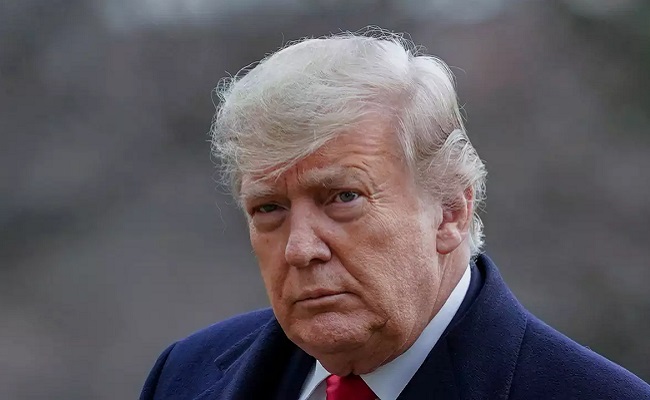
Former US President Donald Trump is up against a "make or break" this week as he faces several cases down the road starting with the New York Attorney General's tax fraud case where a judicial opinion could send him spinning into a great financial ruin and other issues that could spiral out of control and undermine his defence against election subversion charges.
Trump is staring down a $370 million penalty in a tax fraud settlement that could plunge him into financial ruin with his business licences in New York being cancelled and a judicial opinion that could undermine his defence against criminal charges related to election interference and a Supreme Court case that could keep him off the ballot come November.
There's a great chance that all three cases could run parallel causing a major headache for Trump and much tension as the legal dramas gain momentum this week within days of each other keeping him off the campaign trail, media reports said.
New York's Judge Arthur Engoron, presiding over Trump's civil fraud trial, allowed a self-imposed January 31 deadline to slip, though a ruling is expected imminently that would finalize damages incurred when Trump reportedly committed fraud by inflating his net worth to obtain favourable treatment from banks and insurers. He's alleged to have secured loans violating legal norms based on inflated valuations from Deutsche Bank (from $3.5 billion to $6.5 billion).
As the New York judgement is projected to go into early to mid-February, according to a court spokesman, Judge Engoron has pushed his ruling timing closer to the date the High Court considers Trump's ballot status.
Of pivotal importance to Engoron's ruling is a federal appeals court could expedite its judgement on a Trump plea that he enjoyed executive immunity as President and so would not be obliged to testify. Any decision on presidential immunity could either upend the former president's several criminal cases or undercut his principal defence in them, media reports said.
The reasons for Judge Engoron's delayed decision are not clearly unknown, though he had given a summary judgment penalising Trump with fines and ordering the cancellation of his business licences but kept them in abeyance waiting for the appeals court to decide pleas of presidential immunity.
In any case, the stakes are very high for both the prosecutor – New York AG Letitia James and her predecessor Cyrun Vance – and Trump's legal team. New York AG Letitia James is seeking a staggering $370 million penalty from Trump.
The ruling will also determine whether Trump is barred from participating in New York's real estate industry or running any company in the state – a potentially blistering decision that could effectively eviscerate the business empire he built over decades, which ultimately propelled the real estate mogul to the world’s most powerful political position, a USA TODAY commentator observed.
The long-running civil fraud case has been a source of intense frustration for the likely Republican presidential nominee, who is certain to appeal Engoron's decision in the Supreme Court. As he did with the Colorado's SC's decision that kept him off the ballot in the state invoking the 14th amendment on insurrection charges with his inciting attacks by supporters on Capitol Hills on January 06, 2021.
Notably, the pending judgment comes in the wake of a jury ordering Trump to pay $83.3 million in damages for defaming writer E. Jean Carroll. Combined with the forthcoming damages assessed for fraud, the total could be nearly half a billion dollars and drain his finances to pay such sums – or worse for him, strain his finances 10 months ahead of the 2024 presidential election, the USA Today commentator said.
Trump is already siphoning a portion of his political donations to pay legal fees associated with the 91 criminal charges filed against him in four indictments. In 2023 alone, The New York Times reported, Trump spent roughly $50 million in donor money on legal bills and investigation-related expenses.
Meanwhile, the Supreme Court will hear oral arguments in Washington on February 8 in a blockbuster case that could prevent Trump's name from appearing on ballots come November.
In December, the Colorado Supreme Court found Trump ineligible to hold office under the 14th Amendment of the Constitution. Specifically, they sided with a lawsuit brought on behalf of a group of Republicans and independents who argued that Section 3 of the amendment prohibits an "officer of the United States" who took an oath to support the Constitution and then "engaged in insurrection" from holding office again.
Amicus briefs flooded the high court leading up to next week's arguments, parsing every detail of the amendment, including, for example, whether the article in question is “self-executing” or needs an act of Congress to be enforced, or whether the attack on the Capitol amounts to an insurrection and whether Trump actively participated in it.
The 14th amendment was brought by the founding fathers of the US Constitution after the Civil War ended to keep the pro-slavery confederates from holding public offices, but did not specifically name the president, but Colorado interpreted it to include the Presidential post as it was a public office.
The decision – put before a 6-3 conservative majority of which Trump installed three justices himself – is set to have major implications for American democracy and is notably just one of at least three cases the justices are poised to hear that could impact the 2024 presidential election, legal experts said.
At a hearing last month, where Trump’s attorney and Justice Department prosecutors squared off over the issue, the panel of three judges seemed deeply sceptical over Trump’s reliance on immunity. Among other things, the judges took issue with the underlying assumption from Trump’s lawyer that the Senate must convict a president first through impeachment in order for prosecutors to be able to file criminal charges against him.
They pointed out that many Senate Republicans, including Minority Leader Mitch McConnell, voted against impeaching Trump based on the assumption any criminal activity would be handled by the criminal justice system. They also questioned the limits of presidential immunity – at one point asking Trump’s lawyer whether the same logic would apply, for example, to a president who used the military to assassinate a political rival.
While many legal experts feel the judges could deliver a decision within days of the hearing, given that they seemed in lock-step with one another, their silence thus far benefits Trump, whose legal strategy for the 91 criminal charges lodged against him in four jurisdictions is rooted in delaying proceedings during the 2024 campaigning for the primaries.
And while most continue to assume the judges will ultimately reject Trump’s immunity claim, the former president is certain to appeal such a ruling to the Supreme Court.













